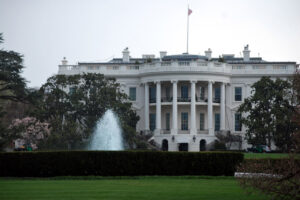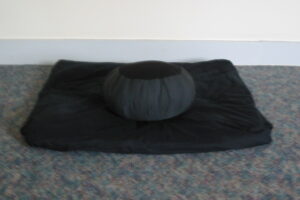As guiding teacher and abbot of the Silent Thunder Order, I engage in regular and fairly frequent online dialogs with our affiliate groups. I answer questions as guest speaker on whatever content the group is studying at the time. I also consult with individual students online, by appointment, for anyone interested in examining the teachings of Buddha and the Ancestors. Please contact me if you think you might be interested.
In a recent meeting with one of our affiliate centers, the focus was on “The Platform Sutra of Huineng,” in which he admonishes all to not find fault with others. One of the members who helps organize these events sent me some questions she wanted me to address. These included the dilemma of how we are supposed to not find fault with people who are waging war on others and committing atrocities such as bombing cities, civilians, and children.
She was concerned that raising these issues might be too personal—in the context of a Zen community—where the underlying premise might be to provide some shelter and sanctuary from the insanity of the world. But I assured her that, no, these very events are apt examples of the very ignorance, and resultant unnecessary suffering, that are pointed to in the foundational teachings of Buddha. And that she is right to raise such questions in the context of Zen practice in modern life.
Amongst more temperate comments, I pointed out that I often felt that if I had the shot on Vladimir Putin I might just pull the trigger. This came up in response to the tough questions she had raised. But I also couched it in the context of one of the “Jataka Tales”— apocryphal stories of Shakyamuni’s former lives, imagined or not—in which he killed a drunken swordsman on a boat who was angrily killing others. The moral of the story is that Buddha not only ended the carnage but stopped any karmic consequence to the perpetrator dead in its tracks. My main point was that Buddha was not afraid to accept any consequences to himself of committing such an act. And we do not practice Zen to avoid suffering or as a way of ignoring the suffering of others in the world.
In our regular recap the next day, the practice leader kindly reminded me that the subject of politics is so divisive that the membership had wisely decided to avoid mentioning it for the sake of maintaining harmony in the sangha. For one thing, we are not likely to resolve the ideological conflicts of the day by debating them, even from the perspective of the “compassionate teachings” of buddha-dharma. For another, whoever brings up the subject is likely to be stereotyped as being on one side or the other of the imagined divide. On the other hand, silence is often complicity. Damned if you do…
In the case of a public Zen teacher such as myself, typecasting can be damaging to our reputations as presumably neutral—if not passive—observers of the passing pageantry of life. Reportedly, one or more of the members complained, and rightly so. We don’t come to Zen for debate. We come to Zen for relief from the insanity of society, finding sanctuary in its midst. But others found the discussion refreshing. And germane.
Matsuoka Roshi would often remark that “Civilization conquers us.” He pulled no punches in speaking about the highly polarized issues of his time, as you can read in his published talks. But I can, nonetheless, apologize for indulging gratuitous remarks on the exasperating world of politics in a discussion of the Platform Sutra. It was not necessary to the point I was trying to make. My comments regarding the past POTUS (and present candidate), and the foreign dictators he seems to admire so highly, were not meant to inflame the situation (which does not need my help to make it worse than it already is). I have no firm grasp of the history of Ukraine, or the events leading to the annexation of Crimea, and so forth. So my remarks regarding the resolution of that humanitarian crisis are as uninformed as anyone’s.
But my intention was not so much political as altruistic. Peace is aligned with the compassion of Buddhism. The indiscriminate bombing of civilians, including children, is not political. It represents, instead, an inexcusable failure, and utter collapse, of the international political system. There is no defense for it, whatever your ideology. I am sure that we can all agree on this point.
I could have just as appropriately referenced Lyndon Johnson and the Vietnam War, which Matsuoka Roshi wrote and spoke out about passionately, decrying the puppet regime we propped up in the South against the Communist North. Including the horrific carpet-bombing of Hanoi and Cambodia, which has come back into the news cycle, with Henry Kissinger still struggling to justify himself. Or that of Berlin and Hamburg, for that matter. Not to mention Iraq and Afghanistan. They are also relevant to the point, just not as timely. Both sides of the partisan divide are to be found guilty, if not equally, in our regrettable history of egregious decisions in the arena of war, based on whatever good intentions.
My first awareness of the divisive nature of politics came in 1953, when my mother voted for Dwight Eisenhower, the Republican candidate, and my father voted for the Democrat, Adlai Stevenson II, the former governor of Illinois, our home state. I was 12 years old. Dad hit the ceiling, to put it mildly; mom’s vote had simply canceled his. I used to watch and wonder, for what seemed like hours, listening to my dad and his step-father endlessly arguing the foolishness of the current administration. Which led me to consider the middle way of politics.
My latest book, The Razorblade of Zen, will give you a more comprehensive and considered perspective on my view of Zen’s place in America as a third, middle way—between the extremes of theism, religion, and fundamentalism on one end of the cultural spectrum—or those of rationalism, science, and secular reductionism on the other. Briefly, in respect to partisan politics, if we carefully consider the labels “conservative” and “liberal,” we can see that so-called conservatives are people who want to liberalize certain things—like over-regulation of industry; while so-called liberals want to conserve certain things—like access to reproductive health care.
My intention is not to argue the legitimacy of either viewpoint, just to remind us that on a basic level, we are neither solely “conservative” nor “liberal.” What is important is what we want to conserve, or liberalize, for the betterment of all. I want to conserve Zen practice, and to liberalize Americans’ embrace of it.








